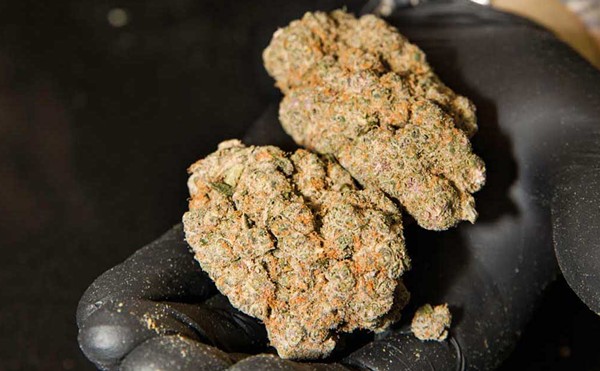Chad Anderson isn’t quite sure what Delta-8 gummies are, but he keeps coming back for the potent high.
“It’s like a strong body buzz,” Anderson tells Metro Times. “They take about an hour to kick in, and I get high as fuck. It’s just as good as regular pot — and it’s cheaper.”
Delta-8 THC is an intoxicating compound synthesized from hemp. A popular alternative to traditional cannabis, it’s sold in cartridges, concentrates, gummies, chocolates, and tinctures at smoke shops and convenience stores that aren’t licensed to sell marijuana.
Federal law doesn’t prohibit the sale of Delta-8 because the 2018 farm bill, which legalized hemp, doesn’t address the compound. Its cousin, Delta-9, is the primary form of THC found in most marijuana products.
Anderson prefers Delta-8 because it’s easier to find in Detroit, which imposed a moratorium on the sale of licensed, adult-use marijuana while it came up with a social-equity plan to help Detroiters harmed by the war on drugs get a leg up in the cannabis industry by giving them priority. But last month, a federal judge halted Detroit’s social-equity plan, deeming its priority for Detroiters “likely unconstitutional.” Now, legal cannabis sales are in limbo in Michigan’s largest city.
If Delta-8 sounds too good to be true, it just might be. Delta-8 is unregulated on the federal level, and that means there’s no guarantee of its safety or purity. The products aren’t independently tested, and there are no credible studies of the effects of Delta-8.
Last month, the U.S. Cannabis Council issued an alarming report that described the Delta-8 market as a “rapidly expanding crisis” that “presents a public health risk of potentially wider impact than the vape crisis.”
The group tested 16 Delta-8 products purchased in Michigan and seven other states and found potentially harmful compounds such as chromium, copper, nickel, and lead, along with unsafe solvents, including hexane, methanol, dichloromethane, ethyl acetate, heptane, acetone, and isopropanol.
In April, the Michigan Poison Center at Wayne State University issued a warning about Delta-8, saying it has been marketed or mislabeled as CBD, a non-psychoactive compound found in cannabis plants.
“Because products containing delta-8-THC are packaged in similar forms as CBD, young children and teens have a higher risk for accidental use of the compound,” the bulletin states.
The real dangers of Delta-8 emerge during the conversion process, which involves extracting the compound from hemp or CBD, says Lev Spivak-Birndorf, chief science officer at the Michigan-certified PSI Labs, which tests legal cannabis before it’s sold at dispensaries. If the extraction isn’t done properly, solvents such as those found in the U.S. Cannabis Council study can remain bonded to Delta-8.
“The conversion process is where it gets dicey,” Spivak-Birndorf tells Metro Times. “Without proper guidelines from regulatory agencies, you’re at risk of amateurs making decisions that can have ramifications.”
Without proper cleanup or purification, elevated levels of copper, chromium, and nickel can remain in the final product.
All of these dangers could be alleviated through testing, Spivak-Birndorf says, noting that Michigan has one of the most stringent testing requirements for metals in cannabis.
PSI Labs recently tested Delta-8 products for potency, and the results were “really eye opening,” Spivak-Birndorf says. Many of the products, for example, contained unlawful amounts of Delta-9 for the unregulated market.
“In some cases, it was half-cooked,” Spivak-Birndorf says. “It had a little bit of everything. It’s a sure sign that whoever was making this didn’t complete the conversion process. They did zero testing, made up the potency, and it went out (to retailers) from there.”
The findings underscore the importance of process control and proper testing, Spivak-Birndorf says.
“I’d like to see everyone participate in the market and have their products tested,” Spivak-Birndorf says. “You want people to have confidence in what they’re buying.”
He adds, “The more control you have over your dosing needs, the better experience you’re going to have and the less likely you’re going to have adverse effects.”
Michigan lawmakers recently passed a bill that would bring Delta-8 into regulatory compliance. Gov. Gretchen Whitmer is expected to sign the bill, which would limit sales to licensed dispensaries and require Delta-8 to be regulated by the Michigan Regulatory Agency (MRA).
At least a dozen other states have imposed restrictions on Delta-8.
The Michigan Cannabis Manufacturers Association applauded the state’s proposed ban, saying Delta-8 should be regulated to ensure it’s safe.
“Any product that mimics a cannabis high that is either inhaled or ingested should follow the same strict high testing, health and safety guidelines enforced by the Marijuana Regulatory Agency and adhered to by licensed growers and processors,” the association said in a statement. “We greatly appreciate the Legislature's leadership on this critical issue, which will go a long way toward promoting the health and safety of Michigan consumers.”
Amanda Ostrowitz, senior vice president at Fyllo, a regulation and marketing software company, and founder of the regulatory tracking service, CannaRegs, says Delta-8 has caused a headache for states and local governments because the U.S. Food and Drug Administration (FDA) has refused to regulate hemp products. Under the 2018 farm bill, the FDA was supposed to create a regulatory framework for hemp-derived cannabinoids. It never did.
“Delta-8 has become problematic because the federal government isn’t giving any guidance,” Ostrowitz tells Metro Times. “No one really knows what Delta-8 does or doesn’t do because there’s no research. All consumable hemp products should be tested.”Stay connected with Detroit Metro Times. Subscribe to our newsletters, and follow us on Google News, Apple News, Twitter, Facebook, Instagram, or Reddit.







